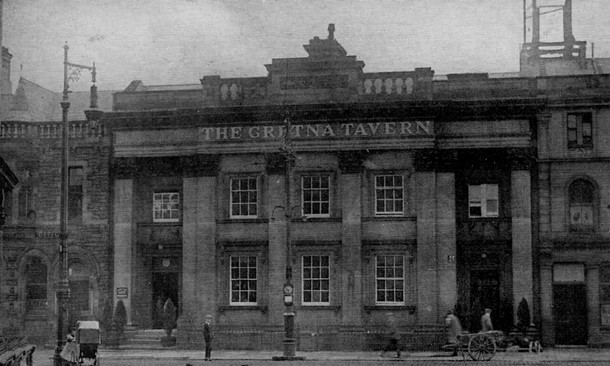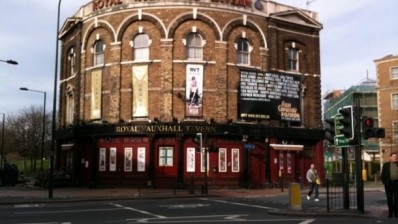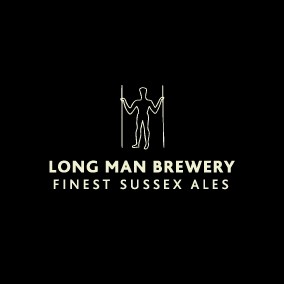The Carlisle Experiment
The extraordinary story of "nationalised" pubs during the First World War

The Gretna was the first pub in the Cumbrian town to be owned and operated by the Central Control Board (CCB) as part of a campaign on the First World War’s home front. By October, 339 licensed premises and five breweries over 500 square miles had been nationalised. In Carlisle itself, 53 of the 118 pubs were closed down and the remaining 65 were directly managed by the state.
The Government aimed for nothing short of changing the drinking culture of a city whose male population had been bloated by the arrival of thousands of munitions workers and builders – all with nothing but boozing to amuse themselves in the evenings.
Food, comfortable seating, nice décor, entertainment and games such as darts, dominoes, snooker and bowls were introduced into the state-owned pubs to counter perpendicular drinking and encourage ‘respectable’ women to use them.
It was a great social experiment, and clearly a successful one since it continued for another 57 years. After the war the scheme’s chief architect Harry Redfern, inspired by William Morris’s Arts and Crafts Movement, continued to develop his vision of a ‘new model pub’. Between 1927 and 1940 he demolished and rebuilt 15 houses and radically redesigned another 87.
In addition, during the war the CCB had created seven vast food taverns, among them the Gretna. Housed in a former post office, the counter was converted into a long bar while the sorting office at the back became a dining room with three long rows of tables and a stage where a piano and gramophone played. Opening for breakfast, in its first year 55% of sales were food.
Perhaps the most ambitious project, Gracie’s Banking at Annan, opened in November replacing two existing pubs. It had a 100-cover restaurant, a 300-capacity beer hall with a balcony from which a light orchestra played, a 300-seat cinema, a billiard room, a bowling green, quoit pitches and a post office.
It all worked. Not only by reducing drunkenness through the war years, but also as a commercial venture. By 1973, when the Tory government felt embarrassed by this triumph of state control and the pubs were sold back to brewers in batches, the State Management Scheme could boast that it had made a profit in every single year of its existence.
Carlisle’s pubs also left a valuable legacy in the shape of the comfortable food and entertainment-led pubs of today. Redfern’s work was undoubtedly influential in the ‘improved pub movement’ between the wars. Indeed, two of the pioneers of that movement, Mitchells & Butlers chairman William Waters Butler and Whitbread managing director Sydney Neville, sat on the CCB.
Yet the State Management Scheme remains a largely forgotten episode in the history of the licensed trade – perhaps because pub managers and staff had to sign the Official Secrets Act.
Now a local campaign led by Carlisle bookshop owner Steve Matthews and the City Council’s retired director of planning Viv Dodd is aiming to put that right.
The 100th anniversary of the opening of the Gretna Tavern will launch a series of commemorative events across the city.
Funded by a £66,000 lottery grant, they will include exhibitions and promotions in local pubs, dramas and short stories and an expansion of the existing State Management Story website that went live two years ago.
Matthews and Dodd are also looking for people to come forward with their own tales of pub life in Carlisle and have started working their way through some 1,700 boxes of documents from the scheme currently stored at the National Archive in Kew.
Excavating that history is a big task, but Dodd is convinced there’s a trade treasure trove to be unearthed. “The State Management Scheme is simply unique. I’d like it back again if I’m being honest – but it won’t happen, not in my wildest dreams!”
Why nationalise?
As the war government ramped up armaments production, some 12,000 munitions workers, plus builders, ancillary staff and a military guard were drafted into the National Munitions Factory that straddled the Scottish border north of Carlisle.
Local pubs were swamped and the stricter licensing laws introduced under the Defence of the Realm Act came under strain. Convictions for drunkenness nearly quadrupled.
David Lloyd George, who already regarded drink as the nation’s greatest enemy, had switched jobs from chancellor to munitions minister and appointed a Central Control Board to get a grip on the problem.
Prohibition was on the cards for a while, as was the complete nationalisation of the drinks trade, but arms production was the urgent issue and in January 1916 the government acquired five licensed premises at Enfield Lock near the Royal Small Arms Factory in north London.
They were followed by 13 pubs around the naval base on Cromarty Firth before the CCB went for the big one.
The smaller schemes ended shortly after the war, but Carlisle’s continued until 1973.
What it meant for licensees – and their customers
Pubs were purchased by the state over a few months with little protest – people in general appreciated it was crucial to the war effort.
Many were closed if they were considered difficult to manage or could not be brought up to a higher standard – at least two didn’t have toilets, not even outdoor ones.
For those that remained, their licensees were invited to become managers, and most took up the offer – though some men were surprised, on returning from the front, to find they no longer owned a business.
Based on the Gothenburg system of ‘dis-interested management’ which disincentivised licensees from selling drink, managers were paid a fixed salary, plus 75% of the GP on food and 25% of the GP on non-alcoholic drinks in order to shift the trade mix.
Alongside the new dining houses like the Gretna, 26 existing pubs were designated as food houses serving state-made meat pies.
As part of their contract, managers had to enforce a beefed-up version of the already stringent First World War licensing regime. In addition to keeping to hours and banning ‘treating’ (rounds), barstaff were instructed to eject drunks, serve spirits in large glasses to allow dilution, refuse credit, turn away “undesirable women” – prostitutes – and prepare hot drinks when a customer asked for them.
Chasers were banned and ‘no spirits Saturdays’ introduced from February 1917, resulting in the virtual elimination of arrests for drunkenness at the weekends.
“It must have been a tremendous change for the licensees, selling food and working to strict rules, it was totally different,” says Viv Dodd. “They had probably never kept proper accounts before, either, and some were dismissed for keeping bad records.”
They were also forbidden to carry on other trades on the premises, and one was sacked for selling hay from the back of the pub.
As for the customers, “some thought it wonderful, others wanted rid of it,” says Dodd. All pubs were, of course, tied to the Carlisle Brewery, consolidated from the five that were nationalised, and there were complaints about the lack of choice in beer.
But the more litigious among the clientele spied an opportunity in state-ownership. Numerous claims for laddered stockings and one for a spoilt pint, after part of a ceiling fell into a man’s beer, all landed on the Home Secretary’s desk.
Today’s licensees and the State Management
Some 50 pubs are still trading in the greater Carlisle area, and many are celebrating their unique history.
Punch lessee Stuart Marshall has run the Howard Arms for two years and installed a mini-museum dedicated to the State Management Scheme on one wall. “Customers have donated memorabilia, bottles and beermats and even a first day cover. It’s such an integral part of our history in Carlisle and our regulars who remember it say it was great. I’d welcome more controls today, in fact.”
Star Pubs & Bars lessee Mike Vose has hung an array of State Management Scheme documents in the upstairs rooms of the Kings Head – Carlisle’s oldest pub.
“It’s a fantastic piece of local history, something no one else can tap into. It was a great experiment, way ahead of its time and it must be the only government-run business that has made money, though it was lot stricter in terms of business operation. Young people aren’t aware of it, but the older guys have fantastic stories to tell.”
Alain and Alison Davis have owned the freehold of the Spinners Arms since 2007 and also run the new 10-barrel Carlisle Brewery on a nearby industrial estate.
“The centenary commemorations are good for us and we’ve really embraced the idea,” says Alison Davis. “I’m Carlisle born and bred, but I knew nothing about the State Management Scheme till we started looking into the history of the pub.
“A lot of the regulars talk about it, a lot of stories and gossip have been passed down, and we’re trying to get the memories out of them. One of our customers, Eric, can remember the old pub being knocked down in 1929!
“Younger people are taken aback when they hear about it, though. It does sound like social engineering!”




